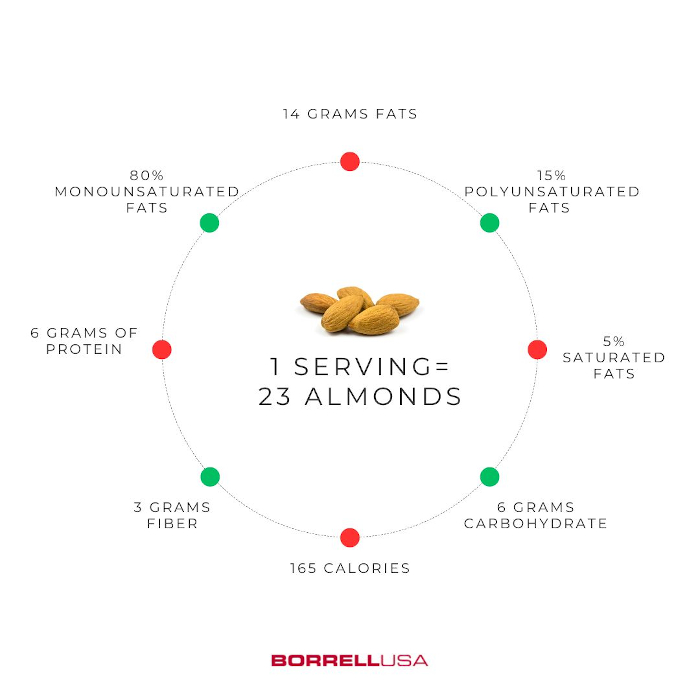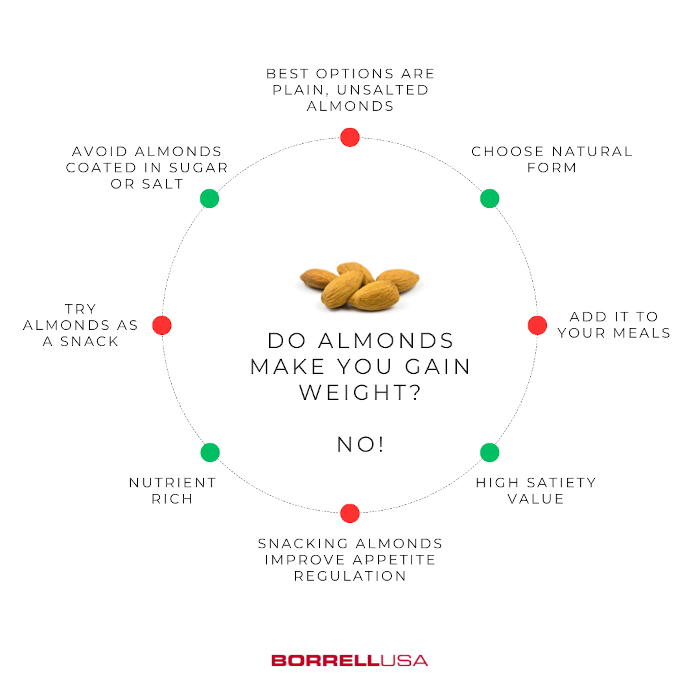Do almonds make you gain weight?

Almonds are nutrient-dense foods that offer numerous health benefits due to their rich content of healthy fats, protein, fiber, vitamins, and minerals.
While almonds are calorie-dense, consuming them in moderation as part of a balanced diet is unlikely to cause weight gain. In fact, research suggests that including almonds in a weight management plan may even support weight loss due to their ability to promote satiety and regulate appetite.
A standard serving of almonds is about 1 ounce, which is roughly equivalent to 23 almonds and provides around 160 calories. It's essential to be mindful of portion sizes and incorporate almonds into your diet in a way that aligns with your overall calorie and nutritional goals.

One serving of almonds equals one ounce, about 23 almonds or ¼ cup. It is a calorie-dense food but also nutrient-dense with the majority of its fat being monounsaturated. One ounce provides about 165 calories, 6 grams protein, 14 grams fat (80% monounsaturated, 15% polyunsaturated, and 5% saturated), 6 grams carbohydrate, and 3 grams fiber.
Additionally, how almonds are consumed can also impact their potential effect on weight. Opting for plain, unsalted almonds or incorporating them into meals and snacks in their natural form is preferable over consuming almonds that are coated in sugar or salt, as added ingredients can contribute extra calories and may not be as satiating.
A review (published in "Nutrients") of 64 randomized controlled trials (RCTs) and 14 systematic reviews and/or meta-analyses provides a detailed analysis of the effect of almonds on weight measures, metabolic health biomarkers, and outcomes, and colonic microbiota.
Almonds are a higher energy-dense (ED) food that acts like a lower ED food when consumed.
Recent systematic reviews and meta-analyses of nut RCTs showed that almonds were the only nut that had a small but significant decrease in both mean body mass and fat mass, compared to control diets. The biological mechanisms for almond weight control include enhanced displacement of other foods, decreased macronutrient bioavailability for a lower net metabolizable energy, upregulation of acute signals for reduced hunger, and elevated satiety and increased resting energy expenditure.
Evidence from randomized controlled trials and observational cohorts indicates higher nut consumption does not appear to cause greater weight gain; rather, nuts may be beneficial for weight control and prevention of long-term weight gain.
Diet and lifestyle changes such as the replacement of less healthful food items (processed meats, refined grain products) with nuts and other healthy foods have the potential to reduce risk of obesity and obesity-related chronic diseases.
A systematic review published in Obesity Reviews in 2021, found that consuming nuts does not result in higher levels of body fat. Healthcare experts and nutritional guidelines might suggest incorporating nuts into diets, excluding those with allergies, due to their positive effects on heart health and metabolism, without any reservations or worries about impacting weight management negatively.

Opting for plain, unsalted almonds or incorporating them into meals and snacks in their natural form is preferable over consuming almonds that are coated in sugar or salt, as added ingredients can contribute extra calories and may not be as satiating.
Ultimately, almonds can be a nutritious and satisfying addition to a balanced diet, but it's essential to practice portion control and be mindful of overall calorie intake to support weight management goals. If you have specific concerns or dietary restrictions, it's always best to consult with a registered dietitian or healthcare professional for personalized guidance.
Sources:
- Baer, D. J., Dalton, M., Blundell, J., Finlayson, G., & Hu, F. B. (2023). Nuts, Energy Balance and Body Weight. Nutrients, 15(5), 1162. https://doi.org/10.3390/nu15051162
- Dreher M. L. (2021). A Comprehensive Review of Almond Clinical Trials on Weight Measures, Metabolic Health Biomarkers and Outcomes, and the Gut Microbiota. Nutrients, 13(6), 1968. https://doi.org/10.3390/nu13061968
- Nishi, S. K., Viguiliouk, E., Mejía, S. B., Kendall, C. W., Bazinet, R. P., Hanley, A. J., Comelli, E. M., Salas‐Salvadó, J., Jenkins, D., & Sievenpiper, J. L. (2021). Are fatty nuts a weighty concern? A systematic review and meta‐analysis and dose–response meta‐regression of prospective cohorts and randomized controlled trials. Obesity Reviews, 22(11). https://doi.org/10.1111/obr.13330
- Hazell, T. J., Islam, H., Townsend, L. K., Schmale, M. S., & Copeland, J. L. (2016). Effects of exercise intensity on plasma concentrations of appetite-regulating hormones: Potential mechanisms. Appetite, 98, 80–88. https://doi.org/10.1016/j.appet.2015.12.016

